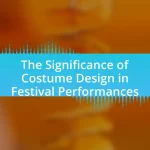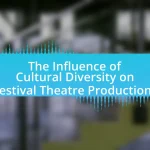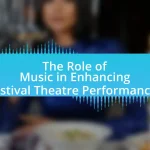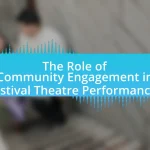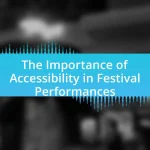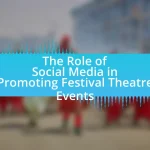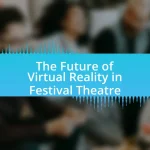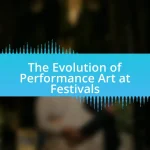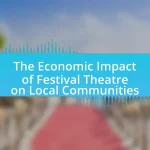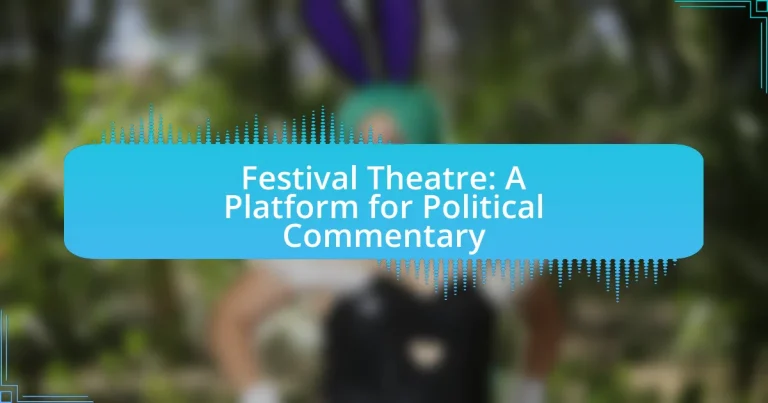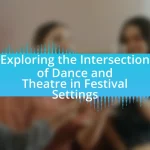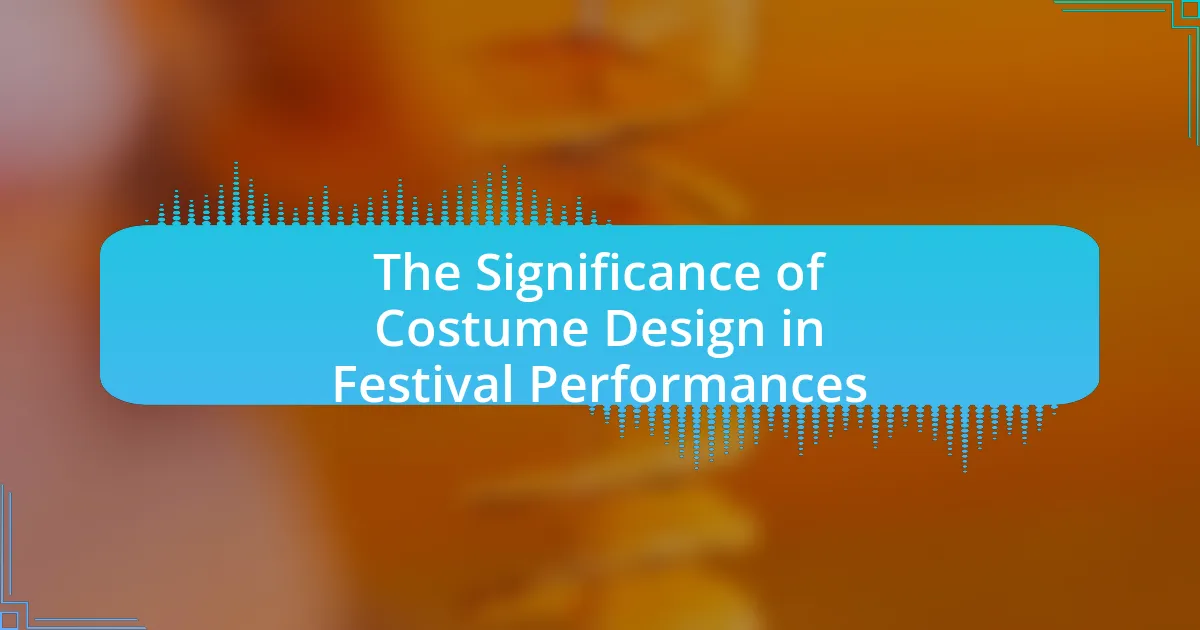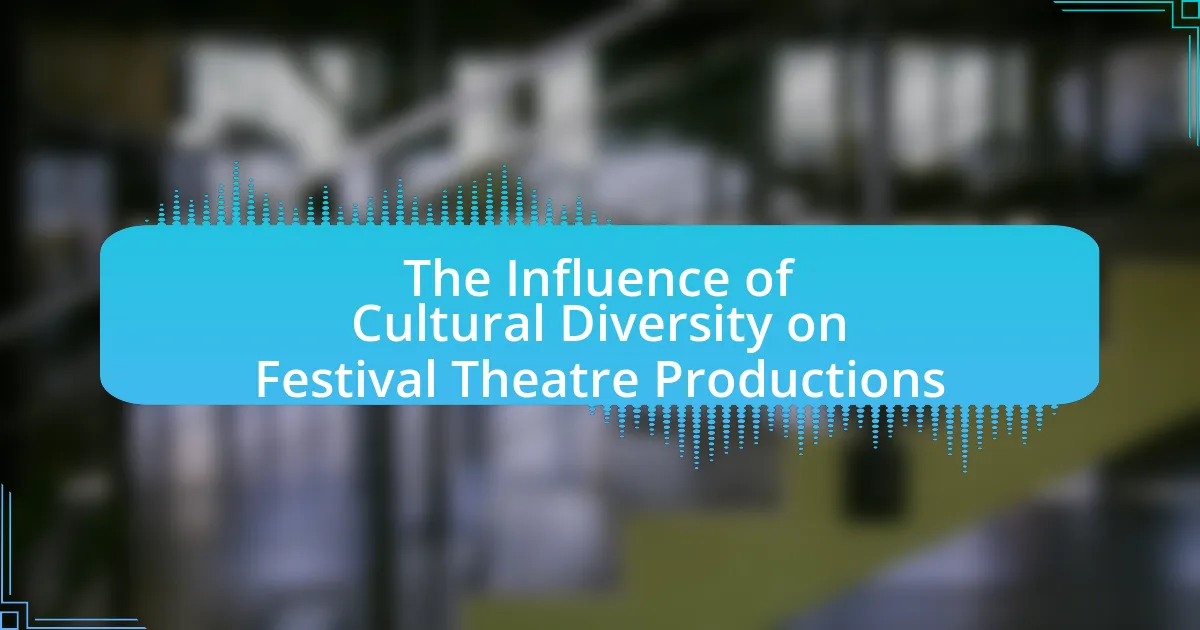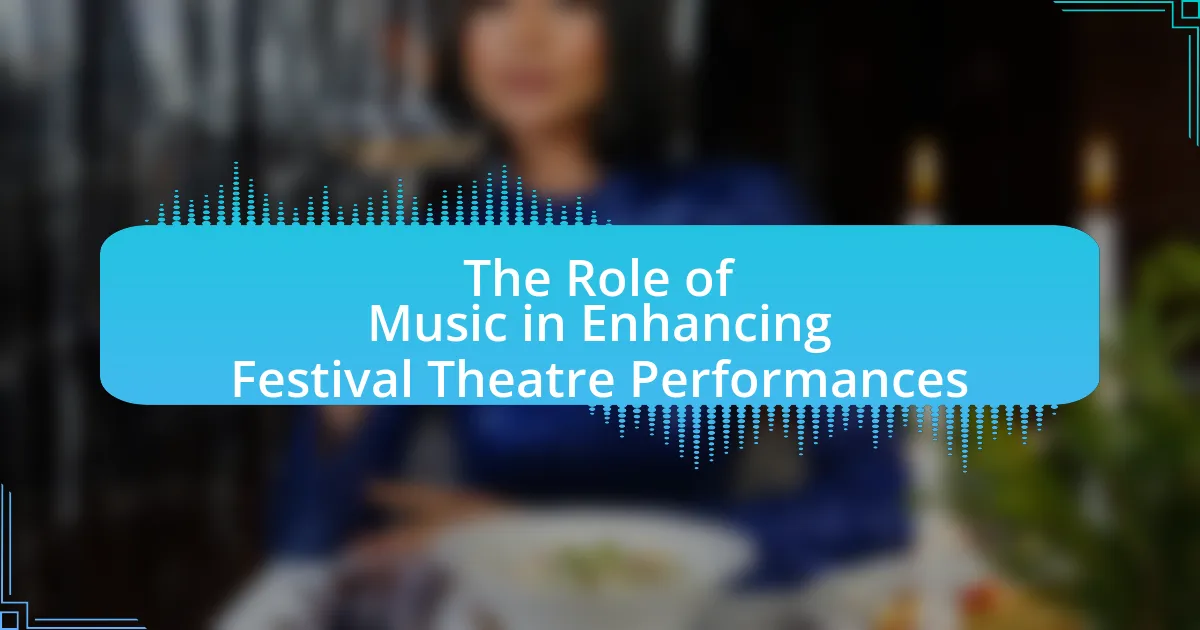Festival Theatre is a form of performance art that emphasizes community engagement and cultural expression, serving as a vital platform for political commentary. The article explores how Festival Theatre addresses contemporary social and political issues, reflecting historical events and diverse cultural interpretations. It discusses the significance of political themes in fostering dialogue, challenging societal norms, and enhancing audience engagement through various performance styles and community involvement. Additionally, the article examines the challenges faced by Festival Theatres, such as censorship and funding constraints, and outlines best practices for effective political commentary and audience interaction.
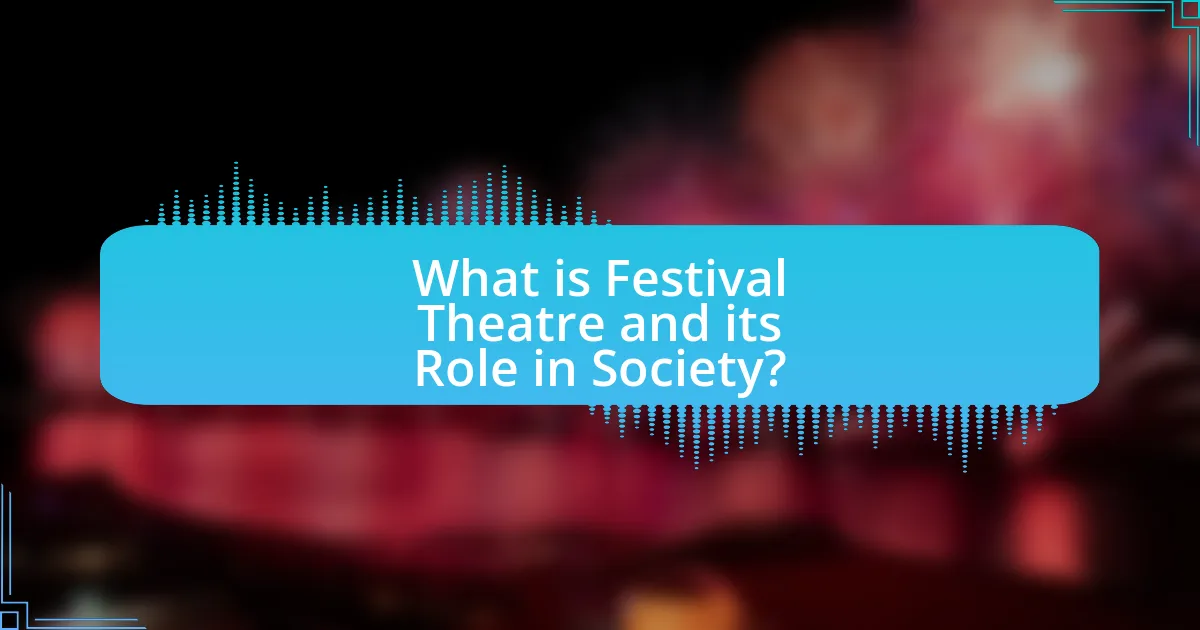
What is Festival Theatre and its Role in Society?
Festival Theatre is a form of performance art that emphasizes community engagement and cultural expression, often taking place during specific events or seasons. Its role in society includes fostering social cohesion, providing a platform for political commentary, and encouraging dialogue on pressing issues. For example, festivals like the Edinburgh Festival Fringe showcase diverse voices and perspectives, allowing artists to address societal challenges through their work, thus enhancing public awareness and participation in cultural discourse.
How does Festival Theatre serve as a platform for political commentary?
Festival Theatre serves as a platform for political commentary by staging performances that address contemporary social and political issues. The theatre often selects plays that reflect current events, challenge societal norms, and provoke discussions about governance, justice, and human rights. For instance, productions like “The Crucible” and “The Vagina Monologues” have been used to critique political systems and advocate for change, demonstrating the theatre’s role in fostering public discourse. Additionally, post-show discussions and community engagement initiatives further amplify the political messages conveyed through the performances, encouraging audiences to reflect on and respond to the issues presented.
What historical events have influenced the political themes in Festival Theatre?
The political themes in Festival Theatre have been influenced by significant historical events such as the civil rights movement, anti-war protests, and the feminist movement. These events shaped the narratives and performances presented in the theatre, reflecting societal struggles and advocating for change. For instance, the civil rights movement of the 1960s inspired productions that addressed racial inequality and social justice, while the anti-war protests during the Vietnam War era prompted theatrical works that critiqued government policies and military actions. Additionally, the feminist movement led to the exploration of gender issues and women’s rights on stage, further enriching the political discourse within Festival Theatre.
How do different cultures interpret political messages in Festival Theatre?
Different cultures interpret political messages in Festival Theatre through their unique historical, social, and cultural contexts. For instance, in Western cultures, political messages may be conveyed through satire and irony, reflecting democratic values and encouraging critical discourse, as seen in productions like “The Crucible” by Arthur Miller, which critiques McCarthyism. In contrast, in Asian cultures, such as in traditional Chinese theatre, political messages often align with Confucian values and may emphasize harmony and social order, as demonstrated in the Peking Opera, which historically served to reinforce state ideology. These interpretations are shaped by the audience’s cultural background, leading to varied receptions of the same political themes across different cultural settings.
Why is political commentary important in Festival Theatre?
Political commentary is important in Festival Theatre because it serves as a vital medium for social critique and reflection on contemporary issues. This form of theatre engages audiences by addressing political themes, thereby fostering dialogue and awareness about societal challenges. Historical examples, such as the works of Bertolt Brecht, illustrate how theatre can provoke thought and inspire action regarding political injustices. By incorporating political commentary, Festival Theatre not only entertains but also educates and mobilizes communities, making it a powerful tool for change.
What impact does political commentary have on audience perception?
Political commentary significantly shapes audience perception by influencing their beliefs, attitudes, and understanding of political issues. Research indicates that exposure to political commentary can lead to increased polarization, as individuals often align more closely with viewpoints that resonate with their pre-existing beliefs. For instance, a study published in the Journal of Communication found that viewers of partisan commentary were more likely to adopt extreme positions on political issues compared to those exposed to neutral commentary. This demonstrates that political commentary not only informs but also actively molds the audience’s perceptions and opinions, reinforcing existing biases and shaping public discourse.
How does Festival Theatre challenge societal norms through political themes?
Festival Theatre challenges societal norms through political themes by presenting provocative narratives that critique power structures and social injustices. Productions often incorporate contemporary political issues, such as inequality, discrimination, and governmental accountability, thereby encouraging audiences to reflect on their societal roles. For instance, plays that address climate change or systemic racism not only entertain but also serve as catalysts for dialogue and action, pushing viewers to confront uncomfortable truths. This approach aligns with the historical role of theatre as a medium for social change, exemplified by works that have sparked movements or influenced public opinion, demonstrating the theatre’s capacity to challenge and reshape societal norms.
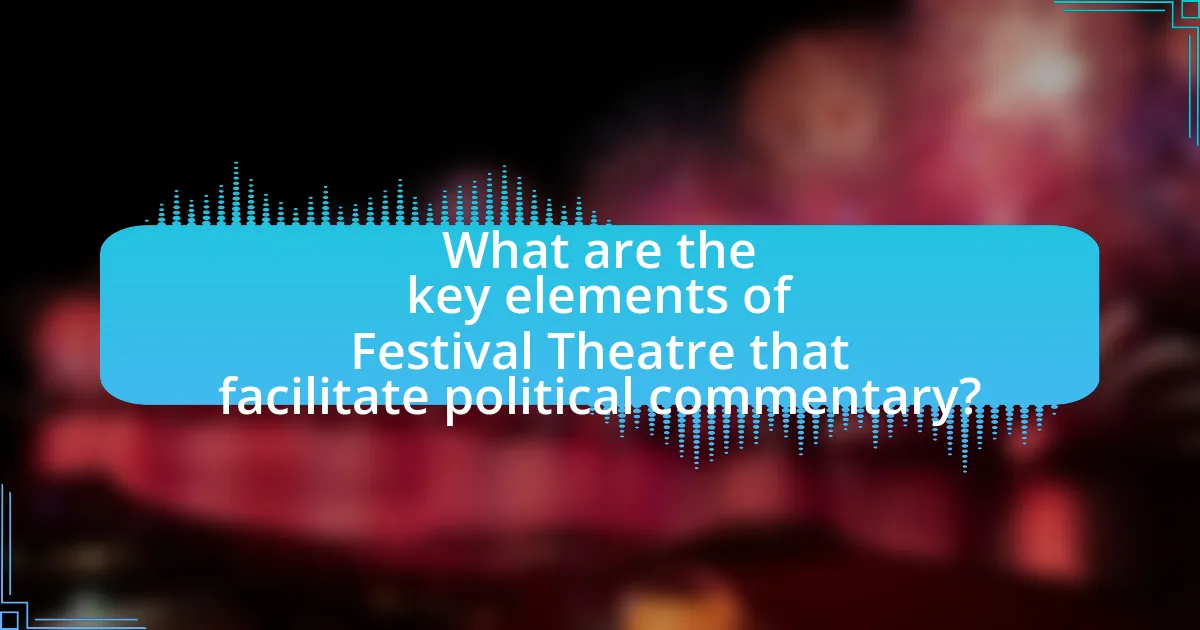
What are the key elements of Festival Theatre that facilitate political commentary?
The key elements of Festival Theatre that facilitate political commentary include diverse programming, community engagement, and the use of symbolic staging. Diverse programming allows for a wide range of voices and perspectives, often highlighting social issues and injustices. Community engagement fosters dialogue between artists and audiences, creating a space for collective reflection on political matters. Symbolic staging employs visual metaphors and innovative designs to provoke thought and critique societal norms. These elements collectively enhance the theatre’s role as a platform for political discourse, evidenced by numerous festivals that have successfully addressed contemporary issues through their performances.
How do performance styles contribute to political expression in Festival Theatre?
Performance styles in Festival Theatre significantly enhance political expression by utilizing diverse techniques such as satire, improvisation, and physicality to engage audiences and provoke thought. These styles allow artists to critique societal norms and political issues in a manner that is accessible and relatable, often breaking down complex topics into digestible performances. For instance, the use of satire can highlight the absurdities of political situations, making audiences reflect on their implications. Historical examples include the use of commedia dell’arte in Italian festivals, which often addressed political corruption through humor and exaggerated characters, effectively communicating dissent. Thus, performance styles serve as a vital tool for artists to convey political messages, fostering dialogue and awareness within the community.
What role does audience interaction play in conveying political messages?
Audience interaction plays a crucial role in conveying political messages by fostering engagement and facilitating dialogue between performers and spectators. This dynamic interaction allows audiences to actively participate in the political discourse presented, making the messages more relatable and impactful. For instance, studies have shown that participatory theatre can enhance audience awareness and provoke critical thinking about social issues, as evidenced by the success of Augusto Boal’s Theatre of the Oppressed, which encourages audience members to intervene in the performance to explore different outcomes. This method not only amplifies the political message but also empowers the audience to reflect on their own roles in societal change.
How do set design and staging enhance political themes in performances?
Set design and staging enhance political themes in performances by visually representing and amplifying the underlying messages of the narrative. For instance, a stark, minimalist set can evoke feelings of oppression, while elaborate, chaotic designs may reflect societal turmoil. Historical examples include the use of stark, oppressive environments in Bertolt Brecht’s works, which aimed to provoke critical thought about political issues. Additionally, the strategic placement of props and the use of color can symbolize power dynamics, as seen in productions like “The Crucible,” where the set design underscores themes of hysteria and authority. Such elements not only support the storyline but also engage the audience in a deeper understanding of the political context being portrayed.
What types of political issues are commonly addressed in Festival Theatre?
Festival Theatre commonly addresses issues such as social justice, human rights, government accountability, and environmental concerns. These themes are often explored through performances that reflect contemporary societal challenges, aiming to provoke thought and inspire action among audiences. For instance, productions may tackle systemic inequality or critique political corruption, drawing on historical events or current affairs to highlight the urgency of these issues. This approach not only entertains but also serves as a catalyst for dialogue and change within communities.
How do contemporary issues shape the narratives in Festival Theatre?
Contemporary issues significantly shape the narratives in Festival Theatre by providing a platform for political commentary and social critique. These issues, such as climate change, racial inequality, and gender rights, are often reflected in the themes and characters of the performances, allowing audiences to engage with pressing societal concerns. For instance, productions like “The Jungle” highlight the refugee crisis, drawing attention to the human experiences behind political debates. This integration of contemporary issues not only enhances the relevance of the narratives but also fosters dialogue among audiences, making theatre a vital space for reflection and action in response to current events.
What historical political issues are frequently revisited in Festival Theatre?
Festival Theatre frequently revisits historical political issues such as civil rights, social justice, and war. Productions often highlight the struggles for equality and the impact of governmental policies on marginalized communities, reflecting on events like the Civil Rights Movement in the United States and anti-war protests during the Vietnam War. These themes are reinforced through performances that draw on historical texts and contemporary interpretations, allowing audiences to engage with the ongoing relevance of these issues in society.
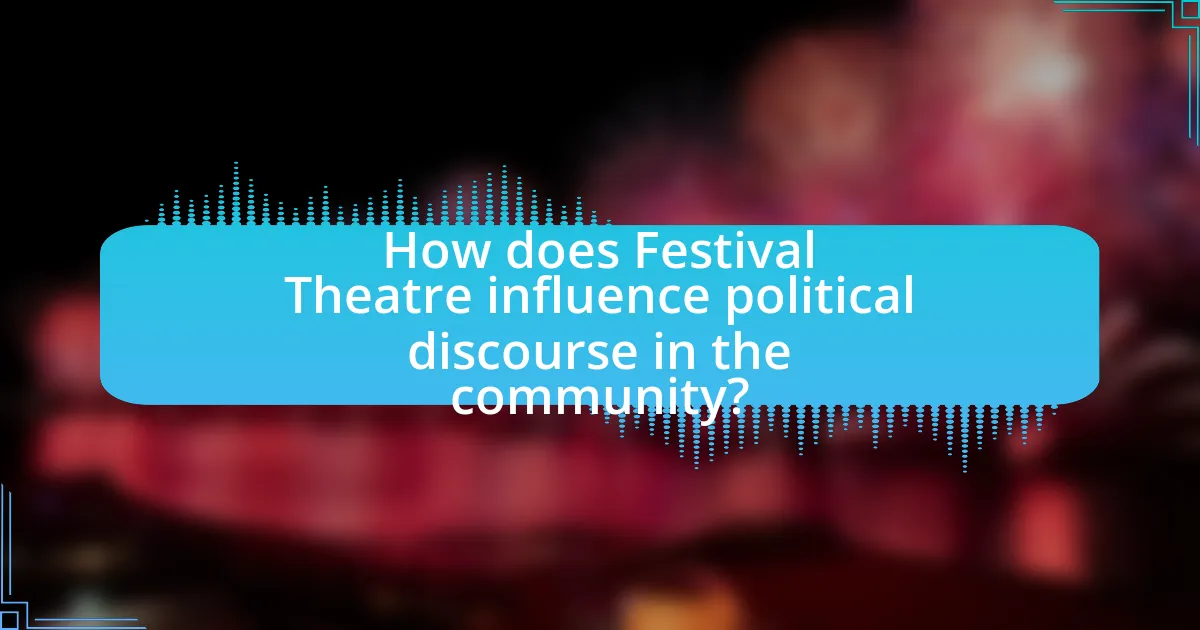
How does Festival Theatre influence political discourse in the community?
Festival Theatre influences political discourse in the community by providing a platform for artistic expression that addresses social and political issues. Through performances that tackle contemporary themes, the theatre engages audiences in critical conversations about governance, justice, and civic responsibility. For instance, productions that reflect current events or historical injustices can spark dialogue among community members, encouraging them to reflect on their own beliefs and actions. This engagement is supported by studies showing that theatre can enhance civic participation and awareness, as evidenced by the increased voter turnout in communities that host politically themed performances.
What are the effects of Festival Theatre on local political engagement?
Festival Theatre significantly enhances local political engagement by providing a platform for community dialogue and awareness. The theatre often showcases performances that address social and political issues, encouraging audiences to reflect on their civic responsibilities. For instance, studies have shown that attendance at politically themed performances can lead to increased voter turnout and participation in local governance. A report by the National Endowment for the Arts indicates that arts engagement, including theatre, correlates with higher levels of civic involvement, demonstrating that Festival Theatre plays a crucial role in fostering a politically active community.
How do festivals create a space for dialogue on political issues?
Festivals create a space for dialogue on political issues by bringing together diverse communities and facilitating open discussions through performances, workshops, and panels. These events often feature artists and activists who address contemporary social and political themes, encouraging audience engagement and reflection. For instance, the Edinburgh Festival Fringe has hosted numerous productions that tackle issues like climate change and social justice, prompting conversations among attendees. By providing a platform for marginalized voices and fostering an inclusive environment, festivals serve as catalysts for political discourse and community engagement.
What role do community members play in shaping the political narratives presented?
Community members play a crucial role in shaping the political narratives presented by actively participating in discussions, performances, and feedback processes within festival theatre. Their involvement allows for diverse perspectives to be integrated into the narratives, reflecting the community’s values, concerns, and aspirations. For instance, community-driven theatre projects often prioritize local issues, enabling participants to express their viewpoints and influence the storyline, thereby fostering a sense of ownership and relevance in the political discourse. This participatory approach not only enriches the narratives but also empowers community members to engage with political themes in a meaningful way, as evidenced by numerous case studies where local voices have transformed the thematic focus of performances to address pressing social issues.
What challenges do Festival Theatres face in delivering political commentary?
Festival theatres face significant challenges in delivering political commentary, primarily due to censorship, audience reception, and funding constraints. Censorship can arise from governmental or institutional pressures that limit the scope of political expression, as seen in various countries where artistic freedom is curtailed. Audience reception poses another challenge, as political themes may alienate certain segments of the audience, leading to reduced attendance and financial viability. Additionally, funding constraints often restrict the ability of festival theatres to produce politically charged works, as sponsors may shy away from controversial topics that could impact their brand image. These factors collectively hinder the effectiveness of festival theatres in engaging with political discourse.
How do censorship and funding affect political expression in Festival Theatre?
Censorship and funding significantly restrict political expression in Festival Theatre by limiting the themes and messages that can be presented. When funding sources, such as government grants or private donations, impose restrictions on content, artists may self-censor to align with the expectations of these financial backers. For instance, a study by the National Endowment for the Arts found that 60% of artists reported altering their work due to funding pressures, which directly impacts the diversity of political viewpoints represented on stage. Additionally, censorship laws can prevent the exploration of controversial topics, further stifling political discourse. This dynamic creates an environment where only certain narratives are allowed, undermining the theatre’s role as a platform for political commentary.
What strategies can Festival Theatres employ to overcome these challenges?
Festival Theatres can employ community engagement strategies to overcome challenges related to audience participation and relevance. By actively involving local communities in the planning and execution of performances, these theatres can create a sense of ownership and connection, which enhances attendance and support. For instance, initiatives such as workshops, open forums, and collaborative projects with local artists can foster deeper relationships with the audience. Additionally, leveraging social media platforms for outreach and feedback can help theatres stay attuned to community interests and concerns, ensuring that their programming resonates with contemporary political issues. This approach is supported by studies indicating that community involvement in the arts leads to increased audience loyalty and participation, as seen in various successful theatre programs across the globe.
What best practices can Festival Theatres adopt for effective political commentary?
Festival theatres can adopt several best practices for effective political commentary, including fostering diverse perspectives, engaging with local communities, and utilizing innovative storytelling techniques. By incorporating a variety of viewpoints, theatres can create a more inclusive dialogue that reflects the complexities of political issues. Engaging with local communities allows theatres to address relevant social concerns and resonate with audiences on a personal level. Additionally, employing innovative storytelling techniques, such as interactive performances or multimedia elements, can enhance audience engagement and provoke critical thought. These practices are supported by the success of various theatre productions that have effectively addressed political themes, demonstrating the potential for theatre to influence public discourse and inspire social change.
How can Festival Theatres engage audiences more effectively on political issues?
Festival theatres can engage audiences more effectively on political issues by incorporating interactive performances that encourage audience participation and dialogue. This approach allows attendees to actively engage with the political themes presented, fostering a deeper understanding and connection to the issues. For instance, productions that include post-show discussions or workshops can facilitate conversations about the political content, as seen in the success of the “Theatre of the Oppressed” methodology, which promotes audience involvement in the narrative. Additionally, utilizing social media platforms to extend discussions beyond the theatre can enhance engagement, as evidenced by the increased audience interaction observed in campaigns like the National Theatre’s “NT Live,” which encourages viewers to share their thoughts online.
What role does collaboration with local activists play in enhancing political narratives?
Collaboration with local activists significantly enhances political narratives by integrating grassroots perspectives and experiences into broader discussions. This partnership allows for the amplification of marginalized voices, ensuring that political narratives reflect the realities faced by communities. For instance, research by the University of California found that community engagement in political storytelling increases public awareness and empathy, leading to more informed civic participation. By working together, local activists and political entities can create narratives that resonate more deeply with the audience, fostering a sense of ownership and urgency around social issues.
